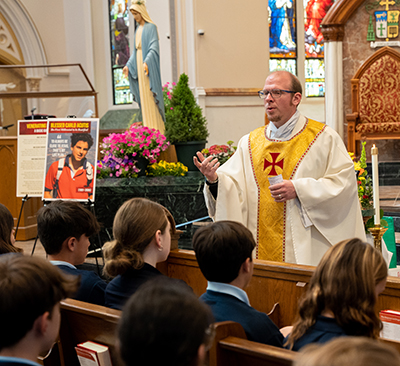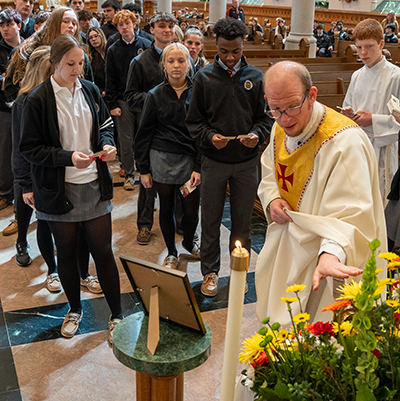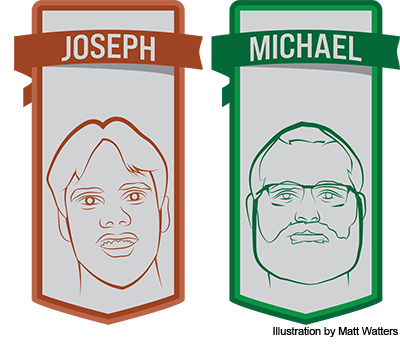
Nurturing faith and building relationships
By Vince Dragone
01/25/2024
Faith magazine recently sat down with Father Jason Feigh, chaplain for Cathedral Preparatory School and pastor of St. Francis Xavier Parish in McKean — where two seminarians have recently come from — to learn more about how he approaches ministry and evangelization with young people.
How do you approach evangelization with your students and parish?
Father Jason: By making faith relational. Making faith relational means emphasizing that faith is about our relationship with God and with each other. It involves connecting theology with real-life experiences, building a community and putting faith into practice through service and community involvement.
How do you go about building relationships with students, and why is this important?
Father Jason: Building relationships with students requires time, vulnerability and authenticity. It's vital because it allows me to understand their needs, doubts and beliefs. I start by being open to their questions, respecting their perspectives and offering guidance when needed.
I don’t make faith mandatory, which means allowing students to embrace their faith voluntarily. This approach fosters genuine faith experiences as it comes from within. It encourages students to explore their spirituality without feeling forced, leading to more authentic connections with God.
Can you share one of your favorite experiences as chaplain for Cathedral Prep?
Father Jason: Reflecting on my experiences as the chaplain at Cathedral Prep, a standout memory for me is the unique Mass we held in the parking lot of Hershey Park Stadium, in Hershey, Pennsylvania. This was particularly memorable because it coincided with the feast of the Immaculate Conception. Knowing that the students would miss this important day at school due to a state championship playoff game, we organized a Mass right there in the parking lot to ensure they could fulfill their religious obligations. It was an extraordinary moment of faith and community coming together in an unusual setting.
Another experience that continually resonates with me is our annual Box Village event — a homelessness awareness event where students sleep outside in boxes, give up comforts and raise money for charity. Although it’s the same event each year, its impact never diminishes. It’s always a profound experience to watch the students as they creatively raise funds and awareness for homelessness. Their commitment to sacrificing their time and comfort for the benefit of others never fails to inspire me. Each year brings a new depth of understanding and compassion, both for me and for the students involved.
Tell us a bit about the two recent priestly vocations to come out of your parish.
Father Jason: When I became a priest, promoting vocations was a core commitment. I pledged to pray for more vocations to the priesthood at every public Mass. This extends to my involvement in movements like Divine Mercy Encounter and other vocation awareness initiatives.
Two years into my priesthood, I shifted my focus to high school ministry and confirmation retreats while keeping vocations, especially to the priesthood, at the forefront of my mission. As I later became a pastor at St. Francis Xavier Parish, I renewed my commitment to praying for vocations. Joseph Preston and Michael Geary, each at different stages of life, stood out as potential candidates for the priesthood.
Our approach to promoting vocations at St. Francis Xavier includes consistent prayer during Mass, Eucharistic adoration, and the sacraments. We encouraged everyday interactions and emphasized that the priesthood encompassed not only sacraments but also daily life. Joseph actively participated in church activities and engaged in Divine Mercy Encounter. He began his college journey, and Michael joined as a pre-theologian. We also initiated programs like the 31 Club — a daily prayer that people sign up for to pray for vocations — and the traveling chalice program to engage the parish community in vocations support. It's been a journey of prayer, interaction and active involvement as we nurture the call to the priesthood and listen to God's voice in ordinary moments.
Father Jason, can you share some insights on how to support vocations in one's own parish and life? What advice do you have for our readers?
Father Jason: Start by taking small steps and meet the Lord at your own level. This can be as simple as dedicating an hour of prayer each day. Be courageous in approaching young men and women and asking them if they've considered a vocation. Don't be afraid to plant that seed. Secondly, encourage a culture of vocation within your parish. If it doesn't already exist, take the initiative to start something. Perhaps ask your pastor to hold a monthly Holy Hour for vocations. Engage with vocation directors or religious orders to provide insights into religious life. In essence, start asking questions and be courageous about it.
Indeed, we've noticed an interesting trend where more men are entering the seminary who haven't attended Catholic schools. While family plays a significant role in vocations, the spiritual family within the parish also has a substantial impact, especially in today's world. We're building a close-knit spiritual family at St. Francis Xavier, which is crucial in nurturing vocations.
Faith magazine had the privilege to interview Joseph Preston and Michael Geary — the two seminarians all from St. Francis Xavier Parish in McKean — to understand better how Father Jason has impacted their discernment.

Can you share when you first felt a call to the priesthood and how Father Jason has been involved in your discernment?
Joseph: I first felt a call to priesthood in 10th grade while at a district band festival playing trombone. At the time, I wanted to be a professional trombone player, but the Lord slowly and gently told me that he had other, better, more fulfilling plans. Father Jason was the first priest I met that I was able to relate to because he was much closer to my age and made it a point to get to know me. He has also always been incredibly supportive. I know that if I need something I can reach out to him, and he will do his best to help out.
Michael: When I was young, around fourth grade, I had a sense that being a priest is what I was supposed to do that I was never able to shake. I tried to for a while, and it just kept coming back. Father Jason and I had a good relationship at Our Lady of Peace Parish when I was growing up. Because of this he was one of the priests I called when I was thinking of applying to the seminary in order to get more educated thoughts on the matter. Since then, he has been my pastor and, for a time, my spiritual director. In these positions, he has been able to provide good advice about being a seminarian, the seminary process, and the priesthood, and he has helped me to grow closer to God through the Mass.
Do you think it's coincidental that two seminarians have emerged from the same parish?
Joseph: At every Mass Father Jason celebrates, he adds “for more young men and women to be open to the vocation to the priesthood or religious life” during the universal prayer. After hearing it week after week and day after day, it made me think, “Maybe God is calling me to be part of the answer to Father Jason’s prayer.” The parish is a vibrant community, and the more we have, the more we are given. Every time I go back home, it seems like there are more altar servers and more people in the pews. I am not really sure why the Holy Spirit has chosen our parish to be the recipient of such generosity. Father Jason loves the Lord and gives his life to him wholeheartedly, and the fruits of this are apparent in his lively parish.
Michael: I do not think it is an accident that Father Jason is the pastor of a church that has two seminarians. Both of us have had different journeys to having him as our pastor. Despite this, we have ended up as seminarians with him as our pastor. For me, I sought him out after I moved back to Erie to join the seminary because of our relationship at OLP and officially joined his parish, so it was a conscious decision to have him as my pastor rather than mere happenstance. Discerning your vocation is no easy task, and it is helpful to have someone who you know and trust and who also knows the subject.
The importance of talking to a parish priest during discernment is often emphasized. Can you describe its significance?
Joseph: I remember the first time I talked about a possible priestly vocation, and I think it is an important step because it changes it from a crazy idea that I have in my head to an actual possibility. When the idea of a priestly vocation becomes more than just a thought, it can be scary; but talking with my priest about it made it more approachable because I knew he was someone who had already gone through the same process.
Michael: It is a small list of people who know well you, the priesthood, and God. Knowledge of these three things, I think, is important to have in order to be able to provide good guidance in discerning the priesthood. One of your parish priests, either current or recent, is going to be the best person to guide you outside of seminary formators because they know these three subjects well. They simply know things about one or more of these areas that others probably do not.
Is there anything else you'd like to share about discernment, seminary life, or Father Jason?
Joseph: If you have ever thought about being a priest or religious brother or sister, give it a try. I always knew that there was a shortage of priests and nuns, but it never really struck me until I was in the seminary. Seminary discernment is hard, but it is a beautiful journey with the Lord; you have nothing to fear.
Michael: Father Jason is a very good resource for discerning the priesthood in no small part because he is an easy person to know. He tries very hard to be friendly and involved with the community beyond his specific duties as pastor.
-
